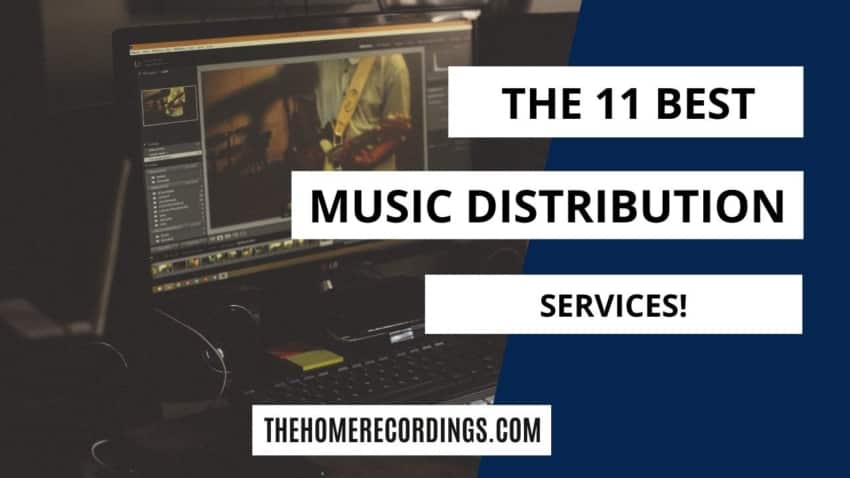Last updated on December 25th, 2020 at 11:41 am
After you’ve written a couple of awesome songs which you think that people are going to enjoy listening to, it’s time to actually reach those potential listeners.
Here’s where music distribution services come in, but even though you might think that you should simply use any of them to get your music out as fast as possible, I’d advise against it.
First you should know what music distributors are even out there to begin with, and which is going to be the best one for your specific needs since some of them are going to charge you an annual fee while some others might be free.
The best Music Distribution Services are;
| Company | Price | Commission | Royalty Collection | Payment Split |
|---|---|---|---|---|
| CD Baby | $9.99 a Song $49 an Album | 9% to 30% | Yes | No |
| Distrokid | $20/year | 0% | No | Yes |
| Ditto Music | $12/year | 0% | No | Yes |
| TuneCore | $10/year per song $50/year per Album | 0% | Yes | No |
| LANDR | $1/mo. For 10 tracks $2/mo. For 30 tracks $4/mo. Unlimited | 0% | Yes | No |
| OneRPM | Free | 15% | No | Yes |
| Amuse | Free | 0% | No | Yes |
| AWAL | Free | 15% | Yes | No |
| Horus Music | $20/year (Discount for additional artists) | 0% | No | No |
| Fresh Tunes | Free | 0% | No | No |
| Reverb Nation | $20/mo. | 0% | Yes | No |
Before we dive into each specific distribution service, here’s what they are designed to do.
What are Music Distribution Services?
In the not so distant past, record labels where the gatekeepers between the artist’s music and it being able to reach their potential listeners.
Record labels where the ones who had to do all the legwork to find deals with distributors to get the music out there.
Because of the digital age we live in, music distribution has become a lot simpler and faster thanks to the online distribution services.
Online distributors help you get your music on to all the different music streaming platforms extremely fast and with ease, such as Amazon Music, Spotify, Tidal, Pandora, and dozens of others, and you can do it yourself directly from their website.
Most of them charge a fixed price, while some others may also charge you royalties on the earnings your music brings in, but what they all have in common is that they allow you to quickly and easily get your music out into the world in a matter of days.
Let’s list some of the best ones currently out there, starting with…
1. CD Baby
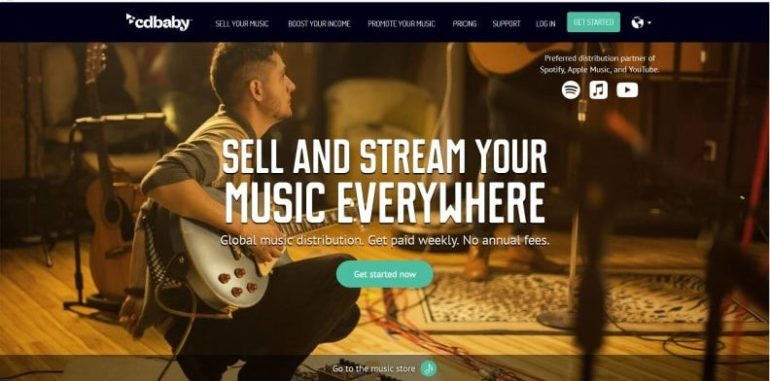
CD Baby is the largest online distributor of independent music in the world.
It has been around for decades distributing music for DIY musicians both in a physical format, like CD and Vinyl, and more recently in digital formats to streaming services like Spotify and iTunes.
It’s one of the biggest, or actually the biggest player when it comes to online music distribution services.
CD Baby offers digital music distribution to more than 150 streaming and download services, which is more than enough for almost every artist.
They are also leading the front in the “one stop shop” business for DIY musician which means that, even though they aren’t there yet, they (as well as most distributors on this list) will be able to collect 100% of your royalties.
This means that you won’t need to register all over the place to collect the royalties yourself and they will do it for you.
And lastly, CD Baby will also upload your music to Facebook and Instagram, which allows people to use it in their videos, and you can earn some revenue off of that as well.
Pros
- No yearly fees
- They allow for physical distribution like CDs, Vinyl, etc.
- One of the only companies that collects your SoundExchange royalties for you
- Facebook/Instagram Monetization
Cons
- 9% commission on digital sales
- $4 commission on physical sales
- Single costs $9.99 and an album costs $49 (one-time payment)
- 30% YouTube commission
- They don’t offer payment splitting
- They don’t offer marketing help for artists who start to gain traction
CD Baby can be a great distributor for anyone who wants to upload music once, pay a one-time fee and be done with it.
I think that it’s the overall better choice, just remember that they will take a cut out of everything you make later on.
If, on the other hand, you need to consistently upload and distribute music, then I’d recommend the next one on this list.
2. DistroKid
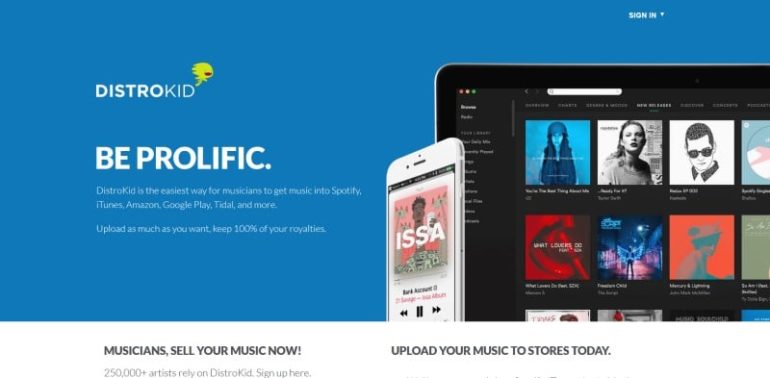
DistroKid is another huge distributor, and it was the first one to offer unlimited distribution for an annual fee.
It keeps rising in popularity not only because of how low the annual fees are, but also because they don’t charge any commissions.
One point to make about Distrokid is that they are usually faster than most other distribution services at getting your music on to every streaming platform.
While most of them take about 3 to 4 weeks to distribute the music, DistriKid does this in a matter of hours to just a couple of days.
It’s important to note that Spotify has acquired a minority stake in DistroKid, meaning that Spotify now has financial interest in seeing DistroKid succeed.
The thing I like the most about DistroKid is its simplicity; It’s just one page to distribute your music.
Payment Splitting
One HUGE PLUS that DistroKid offers is Payment Splitting.
This is an amazing feature since it allows you to divide the royalties earned and pay everyone involved automatically.
Pros
- No Commissions (you keep 100%)
- Unlimited song uploads for a $20 annual fee
- Payment Splitting
- Single Page distribution process
- You can send lyrics to Apple Music and iTunes
- Cloud Storage; You can download your songs if you need to
Cons
- $.99 a year for each release to be on Shazam; 10 song album = $10 a year to be on Shazam (free on other services)
- No admin publishing partner to help collect songwriter royalties
- Bad Analytics
- YouTube fees = $5 each year for every release
- They don’t offer marketing help for artists who start to gain traction
- To be able to use the Payment Splitting mechanism, every collaborator needs to sign up with DistroKid ($20 a year)
- No physical distribution
- No Facebook/Instagram Monetization
As I mentioned earlier, DistroKid can be awesome for anyone who needs to consistently upload music fast.
If you’re someone who releases a song weekly, then I think that Distrokid, as well as the next one on the list, is the way to go.
3. Ditto Music
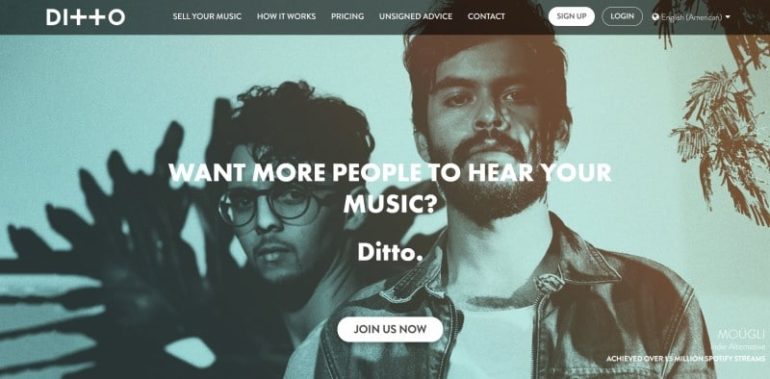
Ditto Music is a bit like DistroKid in the sense that you keep 100% of the money you earn; there are no commissions, plus you pay a yearly fee and you’re able to upload as many songs as you want.
One difference between Ditto Music and Distrokid is that they have a better analytics page.
They offer a 24hr phone support which might come in handy at any given time.
Ditto also does offers Spotify playlist pitching, which can be huge, since being featured on a good Spotify playlist can skyrocket your success as an artist.
Note: Spotify has a whole process where you can submit songs that haven’t been released yet to be considered for a playlist by the curators.
This is done at the Spotify for Artists website.
Here´s an article where I talk about how to get your songs featured on Spotify playlists.
Ditto’s price is $12 per year and you can upload unlimited songs.
Pros
- No Commissions (you keep 100%)
- Unlimited song by simply paying the annual fee
- Good Analytics reports
Cons
- No mechanism in place to help artists who start to gain traction
- No admin publishing partner to collect royalties
- According to online reviews; Bad customer service and hidden fees
Ditto Music is one of the best music distribution services in my opinion, so check it out and see how you like it!
4. TuneCore
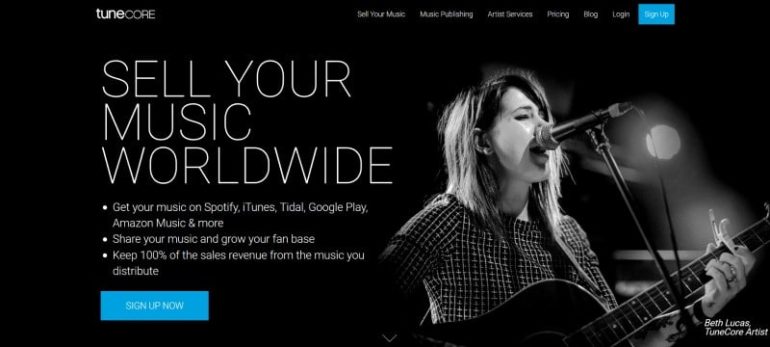
TuneCore, just like CD Baby, is one of the oldest players in this field and has a huge distribution network.
Both are often times compared, but one benefit that TuneCore has over CD Baby is that you don’t take a cut of what you earn.
Basically 100% of your royalties go to you.
On the other hand, they charge a yearly fee for each release, which believe me, will add up.
They charge $10 per year for every single, $30 for an album the first year and $50 for every subsequent year.
Lastly, they charge $20 per year for every ringtone.
Just like CD Baby, they offer Facebook and Instagram monetization.
Pros
- No Commission
- Facebook and Instagram monetization
- No physical distribution of CDs, Vinyl, etc.
Cons
- Annual fees for each release which add up
- No payment splitting
- Complicated for anyone who wants to distribute a cover song
- No mechanism in place to help artists who start to gain traction
5. LANDR
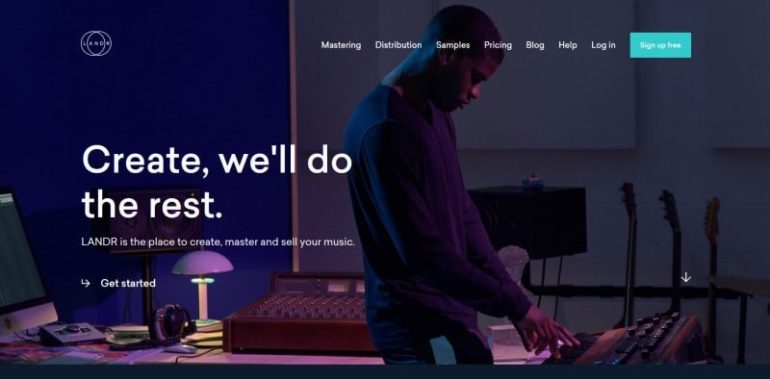
LANDR is known for their automatic mastering service, but they also do music distribution which you get for FREE if you are subscribed to their mastering service.
They also offer you possibilities to get your music on Spotify playlists, which is nice.
Remember, Spotify now added this feature directly from the Spotify for Artists website, just check out the article I previously linked where I go over how to do this.
One thing that I find extremely useful is that LANDR has a collaborative workspace where everyone on the team can work on a track in a centralized location.
The plans are; $1/mo for 10 tracks ($12 a year), $2/mo for 30 tracks ($24 a year) or unlimited which is $4/mo ($48 yearly).
You get instant AI mastering included with all plans.
They even provide a free plan where you can master and distribute two low quality MP3 songs each month.
The free plan might be a great starting point for anyone who simply wants to get their songs out there and doesn’t have the budget to do so.
Pros
- No Commission
- Free Distribution if you are subscribed to their mastering service
- Shared Workspace
- Help you get on playlists
- Royalty Collection
Cons
- Monthly and yearly fees which can add up
- No Payment Splitting
- No publishing administration
- No Seamless Cover Song Licenses
6. OneRPM
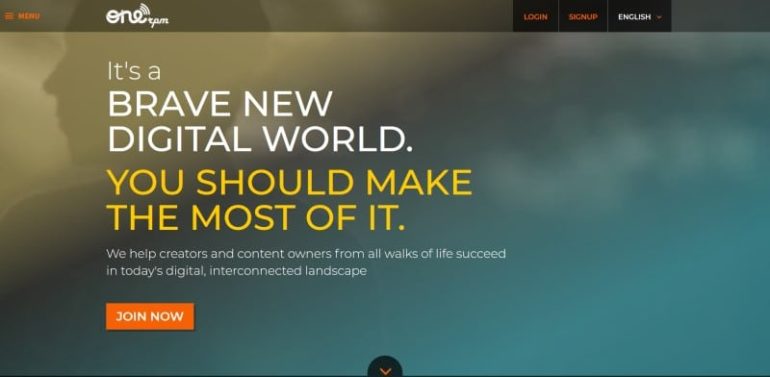
If you’re looking for the best distribution service for Latin American countries, especially Brazil, then you should probably go with OneRPM.
This is because about 70% of all of their clients are from Latin American countries, which means that if you want to reach that specific audience, they will probably know how to do it.
They also have their own playlists, meaning that they can help you get instant reproductions of your newly distributed song.
Additionally, they offer payment splitting just like DistroKid does.
This is one of the few companies that also gives out advances;
If your songs are earning a steady amount every month, they will give you some money in advance to cover the costs of recording your next album, etc.
Pros
- Excellent for Latin American countries
- They have their own video production studios where you can shoot videos.
- Payment Splitting
- Good Analytics
- They offer Payment Advances
Cons
- Highest commission on the market; 15%… yikes
- No admin publishing partner to collect royalties
I would only recommend OneRPM to anyone who seriously wants to penetrate the Latin American Market, otherwise go with any of the other distributors.
7. Amuse
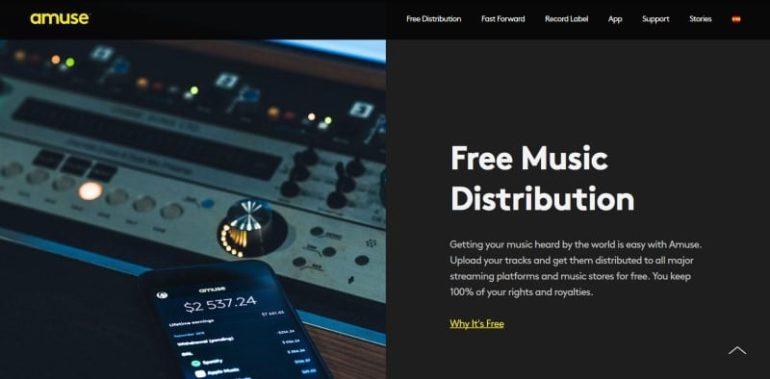
Amuse is one of the newest distributors on the market and it works in a slightly different way than all the others I described.
First, they don’t charge you a fee to distribute the songs, which is already great!
Second, they won’t even charge you a commission on your earnings.
How do they make any money at all then?
The plan Amuse has set in place is to distribute everything for free and then look to sign artists to a 50/50 label deal once they start to catch.
This is an amazing opportunity for people who want to put out a couple songs without spending anything and see if they can be successful.
Another difference is that it’s the only distributor that lets you release music directly from your phone using their app in just a couple of minutes.
Everything can be done from the app, from collecting royalties to viewing the number of streams and downloads, and more.
Pros
- Free distribution
- No commissions
- Phone App
- Give advances
- Pay for marketing
- Royalty Splitting
Cons
- No admin publishing partner to help collect songwriter royalties
- Will not obtain mechanical license for cover songs
If you ask me, Amuse seems a great option if you’re just looking to upload a couple songs for free to see how people react to it.
8. AWAL (Artists Without a Label)
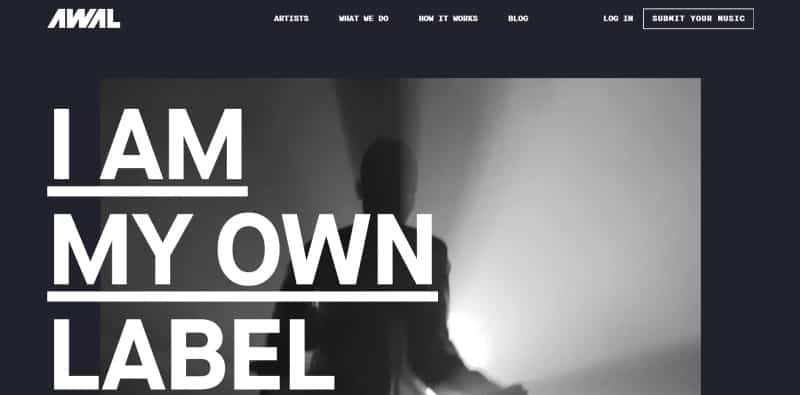
AWAL won’t charge you any fee to put your songs out there, but they will be taking a 15% commission, which is quite a lot.
They do help you get on Spotify playlists which is really cool, and if they really manage to do this successfully, then you’ll be getting a LOT of streams.
They also offer great analytics, physical distribution and Instagram Story music inclusion.
Important note: You can’t just sign up; they must accept you in order to distribute your music.
Pros
- Free distribution
- Help getting on Spotify playlists
- Pretty good analytics
Cons
- 15% commission…ouch
- No Payment splitting
- Must apply and hope that you get accepted
- If you get accepted into playlists, they don’t offer a simple way of seeing which ones your songs are on
- Slow distribution (4 weeks or more)
9. Horus Music
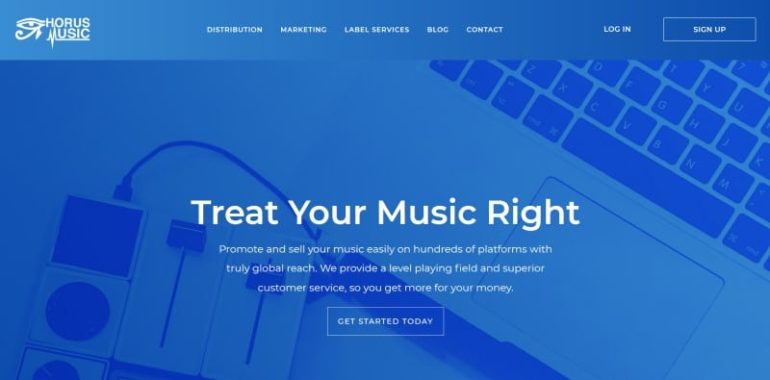
Horus Music is a fairly new company, and this might make you think twice about going with them, which is understandable because you can’t know if they are going to be around for long or not.
However, just like OneRPM has taken almost complete control over the Latin American market, Horus Music has done something very similar with the Asian market.
If you’re primarily trying to reach an Asian audience, then you might want to consider Horus.
One thing to note is that, since they want to maintain a good reputation, they will listen to EVERY song you send to them to check if they are of good quality, and they will accept you -or not-, depending on this.
Horus can also upload to over 200+ stores in 100+ countries.
You can choose between two plans; The Artist plan, that costs $20 and offers unlimited releases, playlist pitching, and more.
Or the Label plan, that offers the same things but for multiple artists.
Pros
- No commissions
- Playlist Pitching
- Good Asian distribution
Cons
- No admin publishing partner to help collect songwriter royalties
- No payment splitting
10. Fresh Tunes
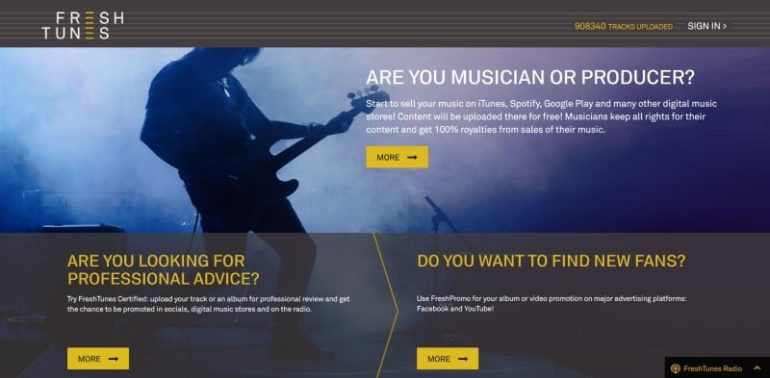
Fresh Tunes is very similar to Amuse in the sense that they don’t charge either fees or commissions.
They earn money through upsells like LANDR does with their automatic mastering services.
One of the ways they earn money is by letting you hire an expert to review your songs for $25 a piece.
Just like Amuse, I recommend Fresh Tunes to anyone who wants to distribute a couple of their songs for free to “see what happens”.
The one con is that they don’t have that big of a reach, like other distributors might have.
Pros
- No fees or commissions
- Can get an expert’s opinion… for $25 dollars
Cons
- Only 15 outlets
- No Payment splitting
- No admin publishing partner to help collect songwriter royalties
- No Playlist pitching
11. Reverb Nation
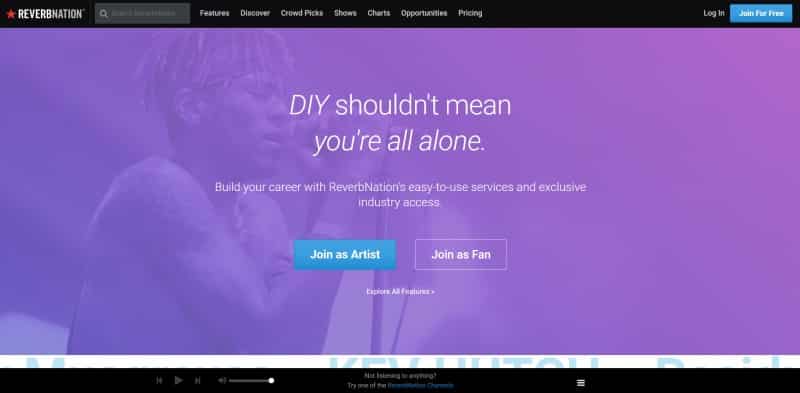
Reverb Nation is a distribution service mostly aimed at bands, and one pro is that they give a lot of opportunities to their artists that other companies might not; like radio submission, festival- and playlist opportunities, and more.
Reverb Nation also has a market research platform called CrowdReview which, while expensive, is exceptionally good.
You have a couple plans to choose from; Free, Basic and Premium.
Free will allow you to upload unlimited songs and do a couple more basic things.
Note: No digital distribution here.
Basic will provide you with more industry opportunities as well as some other bonuses that the free plan doesn’t cover, again with no distribution.
The premium plan will provide you with a free website domain as well as with the digital distribution of your music, mailing list, and more.
This means that in order to distribute music to iTunes, Spotify, etc. you will need the premium plan which is $20 a month.
One issue about Reverb Nation is that they go heavy on the branding, this means that it’s hard to do almost anything independently from them.
Pros
- Good opportunities for radio, etc.
- No commission
Cons
- Monthly fee
- Heavily branded
- Only aimed at beginner bands; if your band starts to catch, you won’t get any help there.
Conclusion
Depending on your needs you should choose one over the other.
I personally like DistroKid and Ditto Music, but if you plan on just releasing one album and be done with it, then go with CD Baby.
If you want to either penetrate the Latin American or Asian markets, then go with OneRPM or Horus respectively.
Lastly, if you’re just starting out and want to see what happens after you published a couple songs, definitely give Amuse a try.
I hope this information was useful and that you have a wonderful day!
